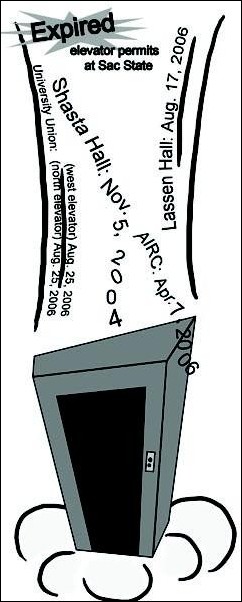Expired elevator permits a concern
Image: Expired elevator permits a concern:Click to enlarge. Graphic by Jocelyn McGregor/The State Hornet:
December 6, 2006
Campus elevators require annual renewals for their permits ?” to date, those permits at Sacramento State have not been posted.
Most of the posted permits on campus have been expired since mid-August except for two: Shasta Hall has a permit that expired in November 2004 and the Academic Information Resource Center, which finished construction in 2005, has a permit that expired in April.
“Thank God I take the stairs,” senior accounting major Steve Cole said.
For elevators to be deemed safe, the campus contracts out to the state-run Occupational Safety and Health of the Department of Industrial Relations. Industrial Relations comes in and evaluates the condition of all the elevators, said the Manager of Customer Services for Sac State, Mark Leisz. New permits are issued after the information and paperwork are compiled and filed unless the elevators don’t meet the safety codes.
By law, the permits at Sac State aren’t required to be posted and, Leisz said, the only reason they are there is for the peace of mind of the students and faculty.
Leisz said that some of the permits have been renewed, they just haven’t been posted. Until all permits have been issued, Leisz said he would not be posting any new permits. However, with the expired permits being displayed, many students wonder why they haven’t been replaced.
“It says something about the safety and the maintenance on campus,” senior journalism major Patrick Dunnigan said. “If they’re not keeping up on the elevators, what else are they not keeping up on?”
Other students feel that it would be fitting for the campus to post up to date permits if they are going to post them at all.
“You’d think with all the money they put into fixing things on campus, they’d remember to put a few permits up,” senior government major Mozeek Johnson said.
Leisz said the process for renewing permits can often be slow. From the time that the state comes in to make the inspections, Facilities Services has a period of 30 to 60 days to make the proper repairs, if any are needed.
Currently, the elevators have been inspected and no safety violations were found, said Industrial Relations Senior William Price.
Leisz said the university is in compliance with the safety codes when Facilities makes the call to Industrial Relations. The work then has to be completed by a contracted service hired by the university.
“The permit means that the elevator has been inspected, and no longer has any code violations on it,” Price said.
Since the elevators have been inspected, it is up to Thyssen Krup, another organization contracted by Sac State, to come to campus and fix the elevators before the permits can be issued. Thyssen Krup was not available for questioning when asked about the delay in permit renewals.
Many of the elevators on campus are the original ones dating back to when the first elevators were installed on campus. Price said the old elevators aren’t put to the same tests as the newer elevators because of the safety codes that were instated for them originally. Meaning, if it isn’t broken, they’re not going to update them.
The elevators are put through many different tests to ensure that they are still capable of performing the duties that they were meant to do when they were first built. That means that weight capacities are tested, ropes are evaluated for their integrity, as well as the brakes and stability components being checked. This kind of test is performed every five years, or if specifically requested by the university in the case of an emergency.
Earlier this year, the motor in one of the elevators in Lassen Hall went out and had to be shut down for 10 days. In the event of an emergency like the one that occurred in Lassen Hall, emergency procedure response time can take anywhere between 30 minutes to a full hour, Leisz said.
Last spring, a power outage at Sac State caused many elevators to stall with people still inside of them. The emergency crews were dispatched and the people were out of the elevators within an hour, Leisz said.
Thyssen Krup will have to come back to campus a few more times before all of the minor issues are resolved. The issues specifically pertain to labeling some of the smaller components and cleaning the elevator shafts. Once those are completed, the permits will all be issued.
“I feel like we’re making a lot of progress with Thyssen Krup,” Leisz said.
Thyssen Krup has been much more “aggressive” in its handling of elevator maintenance, he said. “Our ultimate goal at Facilities Services is for a safe campus,” Leisz said.
Facilities Services is in the process of hiring a consultant to come to campus to asses the possibility of improving and updating many of the elevators on campus. Those improvements may come with the possibility of elevators not being available for a period of time, especially if elevators were to be improved in the parking structures.
“There is a concern of vandalism,” Leisz said. The elevators in the parking structures aren’t shut down during closed times on campus, leaving them open to public use at all times.
No timetable has been given as to when those improvements may take place.
Josh Staab can be reached at [email protected]
















































































































































